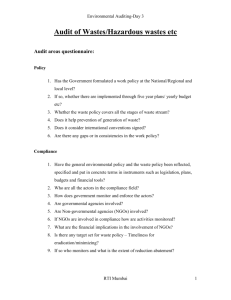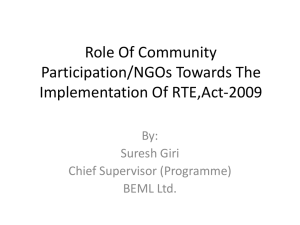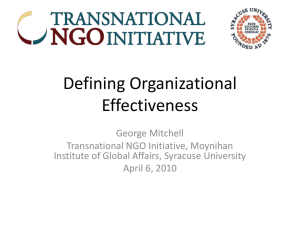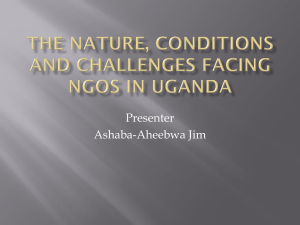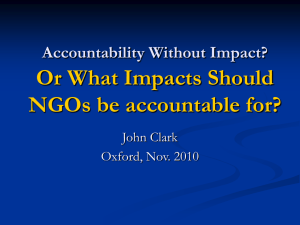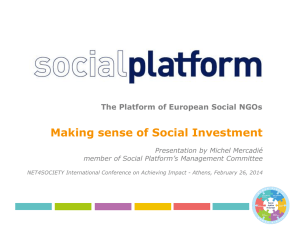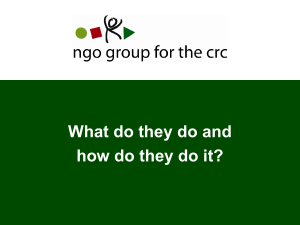PPT - Teacher Education
advertisement
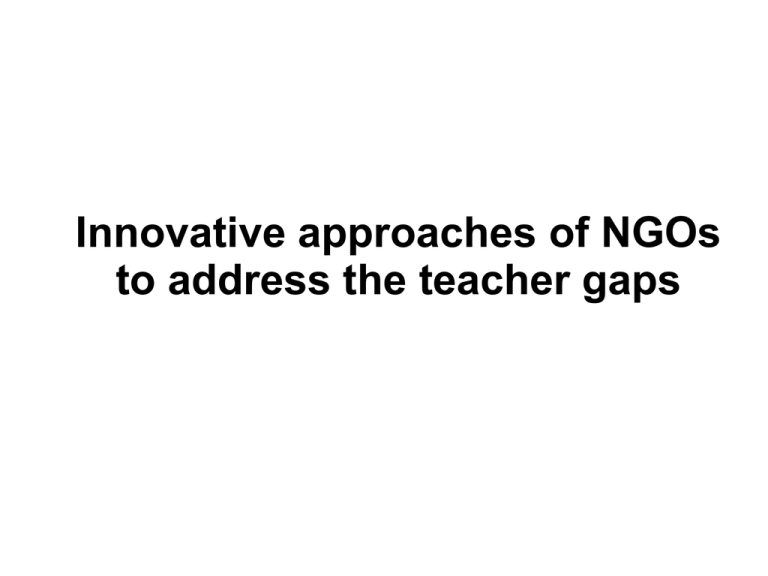
Innovative approaches of NGOs to address the teacher gaps Two aspects to be clarified: • What is the nature of the gap that we need to consider in the Indian context? • What do we mean by an NGO and what qualities are needed to be a part of an effort to fill the gap? The GAP Gap in terms of good teachers and good teacher educators available; Gap in quality institutions for preparing them; Gap in the processes and materials for this; Gap in processes of capacity building for all the above mentioned. What is an NGO NGO, literally means a Non-Govt. Organisation. Includes organisations of very different natures: • They can be small or big, from Govt supported to corporate supported to entirely self financed. The organisations can include: • Service delivery outlets; • Academic and research institutions; • Those working with a collaborative agenda with the State educational process or carrying out their own programs The kind of NGOs that presently work in education: • Private colleges, institutions, even universities for pre-service training (D.Ed, B.Ed. and M.Ed.); • Resource Institutions: • For research and assessment studies • For supporting pre-service and in-service programs including in their visualisation, implementation, material development, faculty and training capacity development; • And then the service deliverers for the various schemes that are initiated by the Govt . The Role that NGOs play/can play - I Set up institutions for preparing teachers and teacher educators - providing quality institutions producing the large numbers required in the Indian context. • Colleges for pre-service training towards Diploma in Education or School Teaching Certificate for elementary teachers - governed largely by the Boards of Secondary Education • Colleges, Institutes and Universities for B.Ed. including integrated B.Sc./B.A. with B.Ed. governed by the Universities The Role that NGOs play/can play - II • Institutions for Research in Education and Masters in Education M.Ed., M.El.Ed, MA(Edu); Support the Government structures in developing and running better teacher and teacher educator preparation programs - In terms of developing alternative models for process and systems, new alternative or enriched materials, capacity building, research etc. The Role that NGOs play/can play - III As Resource Institutions: • Not many of this kind exist • Visualisation, conceptualisation and exploration of in-service and pre-service programs, support in material development, capacity building. As Service delivery institutions: • Many small and big of various kinds, for supporting and conducting teacher training based on developed modules Areas as a Resource agency - I • Possible areas seen: Support to in-service capacity building programs; • Building forums for communication and exchange across hierarchies and among peers; • Building connections between pre-service and in-service programs; • Help build access to new ideas and insights and make them available in local language; • Providing opportunities for exposure and participation in discourse at the cutting edge; Areas as a Resource agency - II • Innovations and trying out of ideas at small and medium scale - on their own and in partnership with the Government; • Developing models and programs for use over a small or a large area of the public system (The possibilities and acceptance for this is declining) • Opening avenues for new discourse on inclusive forums across various platforms/levels Why do we need NGOs • To induce an open culture of democratic dialogue; • Space for wider democratic participation; • Share plural and diverse ideas and explore them; • Explore diversity of context, challenges, multiple ideas, possibilities and approaches; • Communication across hierarchies in institutional spaces and to explore collaborations. Expectations from the NGOs - I • To ensure that NCTE norms are followed by all private colleges; • University inspections and participation in faculty selection for B.Ed. and M.Ed.; • Capability check by Govt institutions to look at the institutions for service delivery; These include largely infrastructure expectations, basic qualifications and number of faculty Expectations from the NGO - II For Resource agencies: No standard parameters available Needed: • Direct relationship and linkage with the schools; • Have capability for good quality studies, research and engagement with academic discourse; • Ability to negotiate and engage academically at the block, district, State and national level; Expectations from the NGOs - III • Capable of building inter institutional partnerships; • Bridging gaps and building respect for plural ideas while maintaining academic rigour; • Focus on becoming participants and collaborators to build capacity in the system; • A commitment and sincerity of purpose with the ability to judge quality and admit shortfalls and mistakes and analyse reasons thereof. Challenges of and for the NGOs I • Major challenge to maintain sense and autonomy of purpose, continue learning and growing of new ideas • Manage the contradictory expectations of becoming self-supporting and raising resources for itself and being unconcerned about being compensated for services provided or materials developed and supplied • Avoiding the trap of the internal discussions and goals and being able to mesh with the outside reality and context Challenges of and for the NGOs II Fees and other charges fixed not sufficient to even provide for salaries Inservice programs inadequately funded and expectations from faculty to provide extra time and make effort unrealistic. No sustained support and sustenance mechanism; Mixed attitude to plurality, diversity, autonomy and decentralization Challenges of and for the NGOs III No systemic recognition and inclusion plan; No systematic mechanism to judge academic ability, experience and rigour; No natural linkages that build capacities and challenge their abilities to do better; Preference to deal with individuals rather than with organisations. What is private and what public - I What do we mean by public? Government structures such SCERT, DIETs, Schools, SSA etc that have been set up to serve the public within reasonable or no costs. Or is it structures controlled by Govt? What about universities? In one sense, any structure that has been set up for the public good could fall in this category. These require support for sustenance. Support can/should be from Govt also! What is private and what public - II Private may refer to: • Individuals supporting the effort as consultants; • Agencies which assist the govt. and expect to be paid; • Corporate – those that are opening their own institutes or those who are assisting the govt. • Resource centres or public registered Societies – these support govt. projects; sometime give direction to govt. Policy/Strategy – Eg. Eklavya, Nirantar, Digantar, Vidya Bhawan, Bodh, Center for Learning Resources, Vikramshila etc. etc. How would we look at foundations like APF, ICEE and others that have their own resources?

